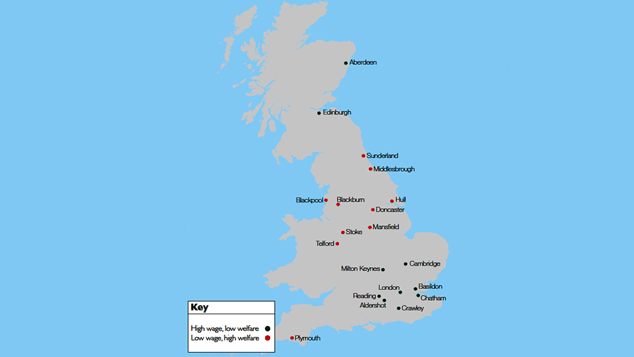Get the latest financial news, insights and expert analysis from our award-winning MoneyWeek team, to help you understand what really matters when it comes to your finances.
You are now subscribed
Your newsletter sign-up was successful
Want to add more newsletters?

Twice daily
MoneyWeek
Get the latest financial news, insights and expert analysis from our award-winning MoneyWeek team, to help you understand what really matters when it comes to your finances.

Four times a week
Look After My Bills
Sign up to our free money-saving newsletter, filled with the latest news and expert advice to help you find the best tips and deals for managing your bills. Start saving today!

Chancellor George Osborne's plan tobuild a "northern powerhouse" couldbe an uphill struggle, judging by thelatest report from the Centre for Citiesthink tank. It notes that 29 of the UK's63 largest cities (excluding Belfast) are"low-wage, high-welfare economies" with average wages below the UKaverage of £504 a week (for 2014), andwelfare spending above the UK averageof £3,358 per head (for 2014/2015).
Nineof the ten worst on this measure arein northern England and the Midlands.Hull's citizens are the worst paid, ona weekly average of £376. Blackpoolreceives the most in welfare spending,at £4,338 per head.
The 14 cities with above-average wagesand a below-average welfare spendingare mainly in southeast England, plusAberdeen and Edinburgh in Scotland.London wages are the highest at £629a week. Cambridge has the lowestwelfare spending at £2,121 per head.
MoneyWeek
Subscribe to MoneyWeek today and get your first six magazine issues absolutely FREE

Sign up to Money Morning
Don't miss the latest investment and personal finances news, market analysis, plus money-saving tips with our free twice-daily newsletter
Don't miss the latest investment and personal finances news, market analysis, plus money-saving tips with our free twice-daily newsletter
Get the latest financial news, insights and expert analysis from our award-winning MoneyWeek team, to help you understand what really matters when it comes to your finances.
MoneyWeek is written by a team of experienced and award-winning journalists, plus expert columnists. As well as daily digital news and features, MoneyWeek also publishes a weekly magazine, covering investing and personal finance. From share tips, pensions, gold to practical investment tips - we provide a round-up to help you make money and keep it.
-
 Should you buy an active ETF?
Should you buy an active ETF?ETFs are often mischaracterised as passive products, but they can be a convenient way to add active management to your portfolio
-
 Power up your pension before 5 April – easy ways to save before the tax year end
Power up your pension before 5 April – easy ways to save before the tax year endWith the end of the tax year looming, pension savers currently have a window to review and maximise what’s going into their retirement funds – we look at how

